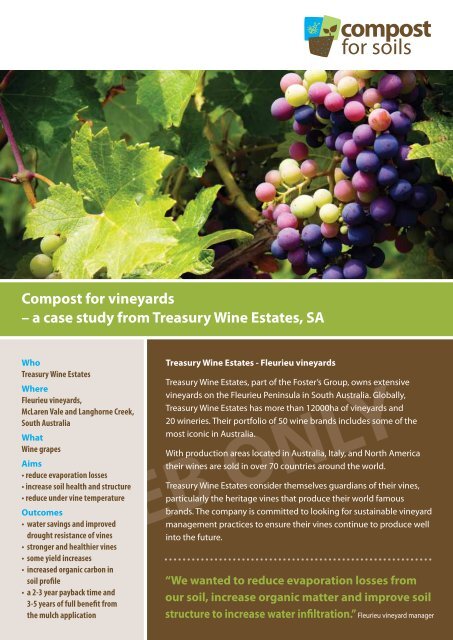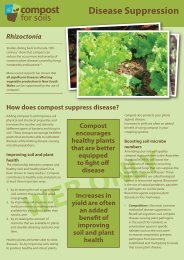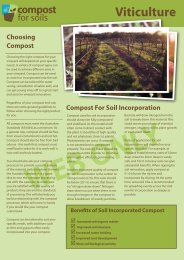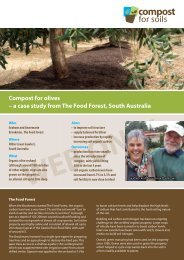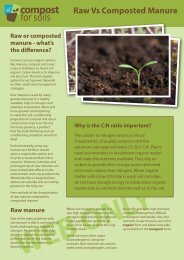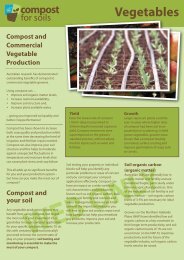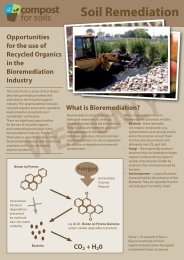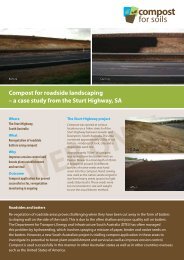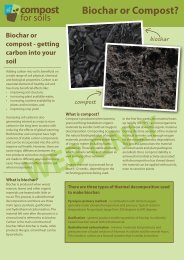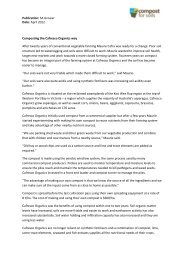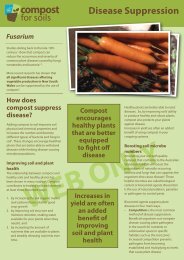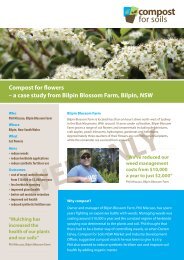Treasury Wine Estates - vineyards - Compost for Soils
Treasury Wine Estates - vineyards - Compost for Soils
Treasury Wine Estates - vineyards - Compost for Soils
Create successful ePaper yourself
Turn your PDF publications into a flip-book with our unique Google optimized e-Paper software.
o<br />
compost <strong>for</strong> soils<br />
<strong>Compost</strong> <strong>for</strong> <strong>vineyards</strong><br />
– a case study from <strong>Treasury</strong> <strong>Wine</strong> <strong>Estates</strong>, SA<br />
Who<br />
<strong>Treasury</strong> <strong>Wine</strong> <strong>Estates</strong><br />
Where<br />
Fleurieu <strong>vineyards</strong>,<br />
McLaren Vale and Langhorne Creek,<br />
South Australia<br />
What<br />
<strong>Wine</strong> grapes<br />
Aims<br />
• reduce evaporation losses<br />
• increase soil health and structure<br />
• reduce under vine temperature<br />
Outcomes<br />
• water savings and improved<br />
drought resistance of vines<br />
• stronger and healthier vines<br />
• some yield increases<br />
• increased organic carbon in<br />
soil profile<br />
• a 2-3 year payback time and<br />
3-5 years of full benefit from<br />
the mulch application<br />
<strong>Treasury</strong> <strong>Wine</strong> <strong>Estates</strong> - Fleurieu <strong>vineyards</strong><br />
<strong>Treasury</strong> <strong>Wine</strong> <strong>Estates</strong>, part of the Foster’s Group, owns extensive<br />
<strong>vineyards</strong> on the Fleurieu Peninsula in South Australia. Globally,<br />
<strong>Treasury</strong> <strong>Wine</strong> <strong>Estates</strong> has more than 12000ha of <strong>vineyards</strong> and<br />
20 wineries. Their portfolio of 50 wine brands includes some of the<br />
most iconic in Australia.<br />
With production areas located in Australia, Italy, and North America<br />
their wines are sold in over 70 countries around the world.<br />
<strong>Treasury</strong> <strong>Wine</strong> <strong>Estates</strong> consider themselves guardians of their vines,<br />
particularly the heritage vines that produce their world famous<br />
brands. The company is committed to looking <strong>for</strong> sustainable vineyard<br />
management practices to ensure their vines continue to produce well<br />
into the future.<br />
“We wanted to reduce evaporation losses from<br />
our soil, increase organic matter and improve soil<br />
structure to increase water infiltration.” Fleurieu vineyard manager
Why compost mulch<br />
The Fleurieu vineyard management team wanted to reduce evaporation<br />
losses from winter rainfall and irrigation, increase the organic matter in their<br />
soils and improve the structure of their soils to increase water infiltration.<br />
They also wanted to reduce the temperature of the soil under vines so that<br />
roots could survive in the top 200mm of soil. <strong>Compost</strong> mulch has been used<br />
on the <strong>vineyards</strong> <strong>for</strong> 12 years.<br />
“One of the best<br />
investments we<br />
currently make<br />
to our vines.”<br />
Fleurieu vineyard manager<br />
The compost product<br />
Initially they produced compost<br />
mulch on site but now all the<br />
product they use is sourced from<br />
commercial suppliers.<br />
Generally, two blends are used.<br />
One is a fine compost mulch chosen<br />
because it will decay quickly and<br />
give rapid improvement in the soil<br />
structure. This is applied to blocks<br />
where a quick lift in vigour is needed.<br />
The other blend is a multi-particle size<br />
blend consisting of 33% fine material<br />
(1-10mm), 33% medium material<br />
(11-20mm) and 33% coarse material<br />
(21-30mm). This blend is used mainly<br />
to reduce evaporation losses and<br />
where slow release of nutrients<br />
is required over a five year period.<br />
Over the years, <strong>Treasury</strong> <strong>Wine</strong> <strong>Estates</strong><br />
has tried a wide range of mulches<br />
including grape marc, manures, straw,<br />
rice husks and their best results<br />
have been achieved with the two<br />
composted blends they now use.<br />
Making the most<br />
of compost mulch<br />
To get the most out of your<br />
compost application it is<br />
essential that good irrigation<br />
management is in place.<br />
Monitoring soil moisture<br />
and understanding soil<br />
water availability will allow<br />
you to adjust your irrigation<br />
schedules to suit the needs of<br />
the crop and help maximise<br />
the benefits of your compost.<br />
This is especially important to<br />
maintain yields, particularly<br />
where a mid-row cover crop or<br />
sward is used.<br />
As well as irrigating less<br />
throughout the season,<br />
applying compost mulches<br />
can also delay the need <strong>for</strong><br />
irrigation, often postponing the<br />
first irrigation application by a<br />
month, or one-two irrigations<br />
depending on soil type and<br />
management factors.<br />
Good irrigation management<br />
practices will help you to<br />
determine when you need to begin<br />
irrigating as well as how often.
The advantages<br />
of compost mulch<br />
There are many benefits of using<br />
compost mulch in the vineyard.<br />
Mulch insulates the soil surface,<br />
regulating the temperature<br />
in the root zone so that roots<br />
are able to survive better in<br />
the top 200mm of soil. Mulch<br />
also improves soil structure<br />
by adding organic matter and<br />
increases water infiltration.<br />
Generally this translates to<br />
water savings of around 30%.<br />
When applied under vines it<br />
acts as a slow release fertiliser<br />
over several years, releasing<br />
potassium initially and then<br />
nitrogen and phosphorus over<br />
several years.<br />
Soil tests can help you work out<br />
which nutrients the mulch is<br />
contributing so you can adjust<br />
your fertiliser applications.<br />
Anything to watch out <strong>for</strong><br />
The Fleurieu vineyard manager<br />
has noticed that weeds also love<br />
compost and they grow bigger and<br />
stronger along the perimeter of any<br />
vineyard that has been mulched.<br />
If the product is coarse then spreading<br />
can also be a challenge as application<br />
equipment can become blocked<br />
easily. It’s really important to use<br />
spreading equipment that is suited<br />
to your compost product to avoid the<br />
frustration of frequent blockages.<br />
“We get 3-5 years of full benefit from<br />
a mulch application and it pays <strong>for</strong> itself<br />
after 2-3 years.” Fleurieu vineyard manager<br />
<strong>Compost</strong> mulch application<br />
The needs of individual blocks are assessed on a case by case basis but<br />
mulch is generally applied at a rate of 110–150m 3 /ha every 3–5 years.<br />
If immediate results are needed the fine blend will generally be applied,<br />
while if longer lasting effects are needed then the multi-particle size blend<br />
is applied. The company has tried numerous rates over the years and found<br />
these rates meet their requirements.<br />
The Fleurieu vineyard team has its own equipment <strong>for</strong> applying the mulch<br />
to the vine rows. Depending on the type of product and the application rate,<br />
the compost costs between $3000 and $4500 per hectare, including the cost<br />
of carting from the supplier to the site.<br />
The bottom line...<br />
Yield impacts (and financial gains) vary widely from season to season but<br />
the <strong>Treasury</strong> <strong>Wine</strong> <strong>Estates</strong> experience has seen a 2-3 year payback time on<br />
their investment as well as 3-5 years of full benefit from a mulch application.<br />
The company has measured a range of benefits from using compost mulch<br />
at their Fleurieu <strong>vineyards</strong>.<br />
Their vines are stronger and healthier with increased trunk diameters,<br />
increased pruning weights and higher numbers of leaves on mulched vines<br />
compared to unmulched vines. This has translated to increased yield in some<br />
blocks. Improvements in vigour are generally evident at the end of the first<br />
season after applying mulch. In some cases leaf greenness improvements<br />
have been seen within one month of applying mulch. Improvements in the<br />
root system, particularly near the soil surface, can be seen within a few months.<br />
Soil health has also improved with an increase in organic carbon levels<br />
throughout the soil profile. Infiltration of irrigation has improved - they’ve<br />
saved water and improved the drought resistance of vines. There has also<br />
been a noticeable increase in the biodiversity of the insects living in the<br />
mulch on the vineyard floor.
Advantages of compost mulch<br />
short-term<br />
• immediate and substantial<br />
water savings<br />
long-term<br />
• increased capacity of the soil<br />
to capture and store water<br />
• increased yields<br />
• moderated soil moisture and<br />
temperature fluctuations<br />
• reduced farm management costs<br />
• improved soil structure and<br />
decreased erosion<br />
Factors that can influence<br />
nutrient uptake from compost:<br />
• climate and season<br />
• soil type<br />
• vineyard location<br />
• compost type<br />
• current and previous cultural practices<br />
• irrigation method<br />
Where to from here<br />
<strong>Treasury</strong> <strong>Wine</strong> <strong>Estates</strong> viticulture team is<br />
happy with the results they’re achieving<br />
with compost mulch but are always on the<br />
lookout <strong>for</strong> better ways to use the product.<br />
They consider compost mulch to be one of<br />
the best investments they currently make in<br />
their vines and would welcome the opportunity<br />
to further increase the benefits of the product.<br />
“We’ve saved water, improved drought<br />
resistance and our vines are stronger<br />
and healthier.” Fleurieu vineyard manager<br />
For more in<strong>for</strong>mation on the program contact:<br />
o<br />
compost <strong>for</strong> soils<br />
An initiative of <strong>Compost</strong> Australia<br />
www.compost<strong>for</strong>soils.com.au<br />
the resource <strong>for</strong> compost users<br />
© <strong>Compost</strong> <strong>for</strong> <strong>Soils</strong> 2011


